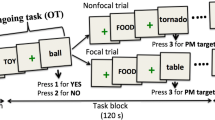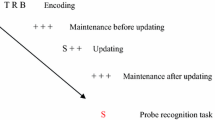Abstract
Background and aims: Remembering to execute an earlier planned action is essential in everyday life, and is a prerequisite for independent living in old age. The purpose of the present study was to determine the influence of age in performing a prospective memory (PM) task and to analyze the differential contribution of working memory and attentional monitoring demands. Methods: In Experiment 1, a group of young and two groups of old adults were assigned to one of two low-demanding conditions: a picture-naming task (only-Naming) and a picture-naming plus a PM task (Naming+PM). In Experiment 2, a group of young and two groups of old adults performed one of two high-demanding conditions, in which working memory and attentional monitoring processes were examined, using a listening span-like task and a 1-back task within the PM paradigm of Experiment 1. Results: Prospective memory performance declined with age even in the low-demanding condition (Experiment 1). Young participants showed PM failures only when the 1-back task was added to the low-demanding condition. Older participants exhibited a marked decline, particularly in the working memory load condition. Conclusions: These results suggest that even low-demanding prospective memory tasks are resource-consuming in old age, and that working memory efficiency, affected by the aging process, plays a crucial role in the successful accomplishment of PM actions.
Similar content being viewed by others
References
Meacham JA, Leiman B. Remembering to perform future actions. In Neisser U, ed. Memory Observed: Remembering in Natural Contexts. San Francisco: W.H. Freeman, 1982: 327–36.
Maylor EA. Aging and forgetting in prospective memory and retrospective memory tasks. Psychol Aging 1993; 8: 420–8.
Maylor EA. Age-related impairment in an event-based prospective memory task. Psychol Aging 1996; 11: 74–9.
Park DC, Hertzog C, Kidder DP, Morrell RW, Mayhorn CB. Effect of age on event-based and time-based prospective memory. Psychol Aging 1997; 12: 314–27.
Einstein GO, Smith RE, McDaniel MA, Shaw P. Aging and prospective memory: the influence of increased task demands at encoding and retrieval. Psychol Aging 1997; 12: 479–88.
D’Ydewalle G, Luwel K, Brunfaut E. The importance of ongoing concurrent activities as a function of age in time- and event-based prospective memory. Eur J Cogn Psychol 1999; 11: 219–37.
Kliegel M, McDaniel MA, Einstein GO. Plan formation, retention, and execution in prospective memory: a new approach and age-related effects. Mem Cogn 2000; 28: 1041–9.
Cherry KE, Martin RC, Simmons-D’Gerolamo SS, Pinkston JB, Griffing A, Gouvier WD. Prospective remembering in younger and older adults: role of the prospective cue. Memory 2001; 9: 177–93.
Cohen AL, Dixon RA, Lindsay DS, Masson ME. The effect of perceptual distinctiveness on the prospective and retrospective components of prospective memory in young and old adults. Can J Exp Psychol 2003; 57: 274–28.
West R, Craik FIM. Age-related decline in prospective memory: the roles of cue accessibility and cue sensitivity. Psychol Aging 1999; 14: 264–72.
West R, Craik FIM. Influences on the efficiency of prospective memory in younger and older adults. Psychol Aging 2001; 16: 682–96.
Einstein GO, McDaniel MA. Normal aging and prospective memory. J Exp Psychol Learn Mem Cogn 1990; 16: 717–26.
Einstein GO, Holland LJ, McDaniel MA, Guynn MJ. Age-related deficits in prospective memory: the influence of task complexity. Psychol Aging 1992; 7: 471–8.
Li KZH, Blackburn AB. Event-based prospective memory in young and elderly adults., Canada: University of Toronto, Ontario, 1994 (Unpublished master’s thesis).
Einstein GO, McDaniel MA, Richardson SL, Guynn MJ, Cunfer AR. Aging and prospective memory: examining the influences of self-initiated retrieval processes. J Exp Psychol Learn Mem Cogn 1995; 21: 996–1007.
Cherry KE, LeCompte DC. Age and individual differences influence prospective memory. Psychol Aging 1999; 14: 60–76.
Reese CM, Cherry KE. The effects of age, ability, and memory monitoring on prospective memory task performance. Aging Neuropsychol Cogn 2002; 9: 98–113.
Henry JD, MacLeod MS, Phillips LH, Crawford JR. A meta-an-alytic review of prospective memory and aging. Psychol Aging 2004; 19: 27–39.
McDaniel MA, Einstein GO. Aging and prospective memory: basic findings and practical applications. Adv Learn Behav Disabil 1992; 7: 87–105.
Bisiacchi PS. The neuropsychological approach in the study of prospective memory. In Brandimonte M, Einstein GO, McDaniel MA (eds.), Prospective Memory: Theory and Applications. Mahwah, NJ: Lawrence Erlbaum, 1996; 297–317.
Glisky EL, Delanay SM. Implicit memory and new semantic learning in post-traumatic amnesia. Neuropsychol Rehabil 1996; 5: 299–318.
Marsh RL, Hicks JL, Cook GI. On the relationship between effort toward an ongoing task and cue detection in event-based prospective memory. J Exp Psychol Learn Mem Cogn 2005; 31: 68–75.
Burgess PW, Veitch E, De Lacy Costello A, Shallice T. The cognitive and neuroanatomical correlates of multitasking. Neuropsychologia 2000; 38: 848–63.
Martin M, Kliegel M, McDaniel MA. The involvement of executive functions in prospective memory performance of adults. Int J Psychol 2003; 38: 195–206.
Kliegel M, Martin M. Prospective memory research: why is it relevant? Int J Psychol 2003; 38: 193–4.
Okuda J, Fujii T, Yamadori A et al. Participation of the prefrontal cortices in prospective memory: evidence from a PET study in humans. Neurosci Lett 1998; 253: 127–30.
Burgess PW, Quayle A, Frith CD. Brain regions involved in prospective memory as determined by positron emission tomography. Neuropsychologia 2001; 39: 545–55.
Burgess PW, Scott SK, Frith CD. The role of the rostral frontal cortex (area 10) in prospective memory: a lateral versus medial dissociation. Neuropsychologia 2003; 41: 439–53.
den Ouden HEM, Frith U, Frith C, Blakemore SJ. Thinking about intentions. Neurolmage 2005; 28: 787–96.
Simons JS, Schölvinck M, Gilbert SJ, Frith CD, Burgess PW. Differential components of prospective memory? Evidence from fMRI. Neuropsychologia 2006; 44: 1388–97.
McDaniel MA, Glisky EL, Rubin SR, Guynn MJ, Routhieaux BC. Prospective memory: a neuropsychological study. Neuropsychology 1999; 13: 103–10.
Mantyla T. Remembering to remember: adult age differences in prospective memory. J Gerontol B Psychol Sci Soc Sci 1992; 49: 276–82.
Cohen AL, West R, Craik FIM. Modulation of the prospective and retrospective components of prospective remembering in younger and older adults. Aging Neuropsychol Cogn 2001; 8: 1–13.
Kliegel M, Martin M, McDaniel MA, Einstein GO. Importance effects on performance in event-based prospective memory tasks. Memory 2004; 12: 553–61.
McDaniel MA, Einstein GO. Strategic and automatic processes in prospective memory retrieval: A multiprocess framework. Appl Cogn Psychol 2000; 14: 127–44.
Einstein GO, McDaniel MA, Thomas R et al. Multiple processes in prospective memory retrieval: factors determining monitoring versus spontaneous retrieval. J Exp Psychol 2005; 134: 327–42.
Rendell PG, McDaniel MA, Forbes RD, Einstein GO. Age-related effects in prospective memory are modulated by ongoing task complexity and relation to target cue. Neuropsychol Dev Cogn B Aging Neuropsychol Cogn 2007; 14: 236–56.
Marsh RL, Hancock TW, Hicks JL. The demands of an ongoing activity influence the success of event-based prospective memory. Psychon Bull R 2002; 9: 604–10.
McGann DM, Ellis JA, Milne A. Conceptual and perceptual processes in prospective remembering: differential influence of attentional resources. Mem Cogn 2002; 30: 1021–32.
Guynn MJ. A two-process model of strategic monitoring in event-based prospective memory: activation/retrieval mode and checking. Int J Psychol 2003; 38: 245–56.
Smith RE. The cost of remembering to remember in event-based prospective memory: investigating the capacity demands of delayed intention performance. J Exp Psychol Learn Mem Cogn 2003; 29: 347–61.
Smith RE, Bayen UJ. A multinomial model of event-based prospective memory. J Exp Psychol Learn Mem Cogn 2004; 30: 756–77.
West R, Bowry R. Effects of aging and working memory demands on prospective memory. Psychophysiology 2005; 42: 698–12.
Kidder DP, Park DC, Hertzog C, Morrell RW. Prospective memory and aging: the effects of working memory and prospective memory task load. Aging Neuropsychol Cogn 1997; 4: 93–112.
Logie RH, Maylor EA, Della Sala S, Smith G. Working memory in event- and time-based prospective memory tasks: Effects of secondary demand and age. Eur J Cogn Psychol 2004; 16: 441–56.
Smith RE, Bayen UJ. The source of adult age differences in event-based prospective memory: a multinomial modeling approach. J Exp Psychol Learn Mem Cogn 2006; 32: 623–35.
Smith RE, Hunt RR, McVay JC, McConnell MD. The cost of event-based prospective memory: salient target events. J Exp Psychol Learn Mem Cogn 2007; 33: 734–46.
West RL. An application of prefrontal cortex function theory to cognitive aging. Psychol Bull 1996; 120: 272–92.
Schretlen D, Pearlson GD, Anthony JC. Elucidating the contributions of processing speed, executive ability, and frontal lobe volume to normal age-related differences in fluid intelligence. J Int Neuropsychol Soc 2000; 6: 52–61.
Craik FIM. A functional account of age differences in memory. In Kljx F, Hangendorf H, eds. Human Memory and Cognitive Performance. New York: Elsevier Science, 1986: 409–22.
Craik FIM, Jennings JM. Human Memory. In Craik FIM, Salthouse TA, eds, The Handbook of Aging and Cognition. Hillsdale, NJ: Erlbaum, 1992: 51–110.
Daneman M, Carpenter PA. Individual differences in working memory and reading. J Verbal Learn Verbal Behav 1980; 19: 450–66.
Smith EE, Jonides J. Storage and executive processes in the frontal lobes. Science 1999; 283: 1657–61.
Bisiacchi PS, Sgaramella TM, Amoroso ML. Neuropsychological evaluation of prospective memory in the elderly. Brain Cogn 1995; 28: 82.
Snodgrass JG, Vanderwart M. A standardized set of 260 pictures: norms for name agreement, familiarity and visual complexity. J Exp Psychol: Hum Learn Mem 1980; 6: 174–215.
Lotto L, Dell’Acqua R, Job R. Le figure PD/DPSS. Norme di accordo sul nome, tipidtà, familiarità, età di acquisizione e tempi di denominazione per 266 figure. G Ital Psicol 2001; 28: 193–207.
Pashler H. Dual-task interference in simple tasks: data and theory. Psychol Bull 1994; 116: 220–44.
Verhaeghen P, Cerella J. Aging, executive control, and attention: a review of meta-analyses. Neurosci Biobehav Rev 2002; 26: 849–57.
Verhaeghen P, Steitz DW, Sliwinski MJ, Cerella J. Aging and dual-task performance: a meta-analysis. Psychol Aging 2003; 18: 443–60.
Johnson MK, Hashtroudi S, Lindsay DS. Source monitoring. Psychol Bull 1993; 114: 3–28.
Verhaeghen P, Salthouse TA. Meta-analyses of age-cognition relations in adulthood: estimates of linear and non-linear age effects and structural models. Psychol Bull 1997; 122: 231–49.
Author information
Authors and Affiliations
Corresponding author
Rights and permissions
About this article
Cite this article
Bisiacchi, P.S., Tarantino, V. & Ciccola, A. Aging and prospective memory: the role of working memory and monitoring processes. Aging Clin Exp Res 20, 569–577 (2008). https://doi.org/10.1007/BF03324886
Received:
Accepted:
Published:
Issue Date:
DOI: https://doi.org/10.1007/BF03324886




